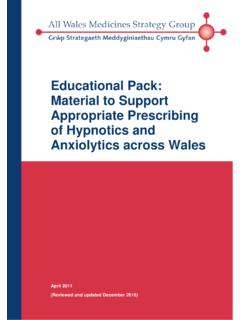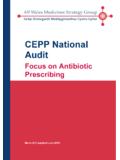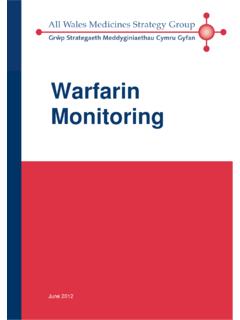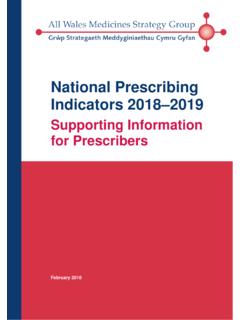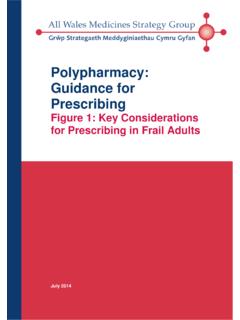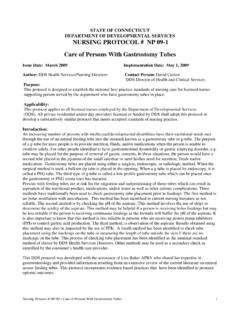Transcription of All Wales Guidance for Health Boards/Trusts in …
1 All Wales Guidance for Health Boards/Trusts in Respect of Medicines and Health Care Support Workers November 2015 This report has been prepared by the All Wales Joint Working Group - Health Care Support Workers and Medicines, with support from the All Wales Prescribing Advisory Group (AWPAG) and the All Wales Therapeutics and Toxicology Centre (AWTTC), and has subsequently been endorsed by the All Wales Medicines Strategy Group (AWMSG). Please direct any queries to AWTTC: All Wales Therapeutics and Toxicology Centre University Hospital Llandough Penlan Road Llandough Vale of Glamorgan CF64 2XX 029 2071 6900 This document should be cited as: All Wales Medicines Strategy Group. All Wales Guidance for Health Boards/Trusts in Respect of Medicines and Health Care Support Workers. November 2015. All Wales Guidance for Health Boards/Trusts in Respect of Medicines and Health Care Support Workers Page 1 of 9 CONTENTS INTRODUCTION.
2 2 SCOPE .. 3 AIMS AND OBJECTIVES .. 4 ACTIONS FOR Health Boards/Trusts .. 4 LEVELS OF MEDICATION SUPPORT/ROLES AND RESPONSIBILITIES .. 5 TRAINING .. 7 SPECIFIC Guidance IN INDIVIDUAL Health BOARDS .. 8 REFERENCES .. 9 All Wales Medicines Strategy Group Page 2 of 9 INTRODUCTION The Guidance is specifically intended for use by registered nurses and midwives who delegate duties to Health care support workers (HCSWs); this will include midwifery care assistants and nursery nurses employed by Health Boards/Trusts in Wales . The guidelines will also be applicable to registered nurses who delegate medicines administration to agency and bank carers working within Welsh Health Boards/Trusts . This document is not transferable to social care, due to NHS Exemptions from the Care Standards Act 20001 and subsequent Regulations ( Wales ) regarding delegation of duties to patients needing nursing care2.
3 However, where a registrant employed by a Health board / trust is responsible for delegation of medicines administration to an unregistered member of third sector/social/educational staff, the unregistered member of staff should either have a Level 3 or above on the Credit and Qualifications Framework for Wales (CQFW)3 or be able to demonstrate training that is equivalent to, and can map across to, Level 3 on the CQFW (2006)3. NHS Wales is committed to the safe management of medicines. There is an increasing need to provide support with medication for individuals being treated in specific acute and community settings throughout Wales ; therefore, guidelines have been developed to ensure safe management. Delegation of medicines administration to HCSWs must only be undertaken where it can be evidenced that it will benefit the individual receiving the support. This may be in community settings or specific acute inpatient areas identified by the Health board / trust .
4 The purpose of the Guidance is to set out a framework to standardise the involvement of the HCSW in the processes involved in medicines management and to ensure that only appropriately trained and assessed HCSWs, with the right knowledge and skills, can provide support with medication and its related tasks. The practice undertaken must be in accordance with locally agreed written protocols and procedures for designated settings, where the Health board / trust has a responsibility for providing care. It is the responsibility of the individual Health board / trust to identify such areas. Though delegation of the task will be from a registered nurse or midwife, in line with 2010 Guidance from the Nursing and Midwifery Council (NMC), Standards for Medicines Management4, the HCSW will be carrying out duties whilst not under the direct supervision of a registered nurse or midwife; the registrant need not be in the same room/building as the HCSW when the delegated task takes place.
5 The Health board / trust will accept responsibility for all tasks undertaken by the HCSW, as long as they are competent and compliant with agreed local written protocols and procedures. All Wales Guidance for Health Boards/Trusts in Respect of Medicines and Health Care Support Workers Page 3 of 9 SCOPE The Guidance is intended to inform Health Boards/Trusts across Wales of where and when an HCSW may be permitted to support children and adults with their medicines, and the necessary education and training standards that are required to support this. The Guidance applies specifically to HCSWs within nursing and midwifery. The scope includes: Assessment of risk Agreed delegation of professional nursing tasks Appropriate definitions The scope does not affect the ability of community nurse prescribers to delegate limited clinical tasks, which may include application of items they have prescribed ( skin or wound care products) to specific individuals.
6 These delegated tasks are individual-specific, not transferable and only applicable for the duration of the specified treatment. Medicines are administered by a number of routes and it may be appropriate for an HCSW giving Level C or Enhanced Support (see section ) to an individual to administer a medicine by one route only, or by a number of routes. The following Guidance is suggested: Table 1. Guidance on routes of administration of medicines by HCSWs giving Level C or Enhanced Support Routes Guidance Oral, topical, inhaled, nebulised medicines. Buccal and transdermal patches. Medicines may be administered via these routes at Level C and/or Enhanced Support. Where deemed Enhanced Support, this would be subject to the HCSW having a Level 3 or above on the CQFW (2006)3, in addition to the specific skills, or being able to demonstrate training that is equivalent to, and can map across to, Level 3 on the CQFW (2006)3.
7 Gastrostomy, jejunostomy. Vaginal, rectal. Intramuscular, subcutaneous. Medicines should not routinely be administered by HCSWs via these routes. However, the Health board / trust may decide to support the administration of medicines by these routes following the appropriate training in specific areas, gynaecology. This would be deemed Enhanced Support and would be subject to the HCSW having a Level 3 or above on the CQFW (2006)3, in addition to the specific skills, or being able to demonstrate training that is equivalent to, and can map across to, Level 3 on the CQFW (2006)3. Nasogastric. Medicines should not routinely be administered by HCSWs via these routes. However, the Health board / trust may decide to support the administration of medicines by these routes following the appropriate training in specific areas, Neonatal Units. This would be deemed Enhanced Support and would be subject to the HCSW having a Level 3 or above on the CQFW (2006)3, in addition to the specific skills, or being able to demonstrate training that is equivalent to, and can map across to, Level 3 on the CQFW (2006)3.
8 Intravenous saline flush using a prefilled syringe only. The Health board / trust may decide to support this practice being undertaken by HCSWs in specialist areas identified by the Health board / trust . Intravenous and intrathecal medicines. Medicines must never be administered by HCSWs via these routes. All Wales Medicines Strategy Group Page 4 of 9 AIMS AND OBJECTIVES The purpose of this Guidance is to enable Health Boards/Trusts to ensure that: There is a documented framework, which the registrant adheres to whilst delegating the administration of medicines to an HCSW. Roles and responsibilities are clarified in relation to the provision of support with medication. Individuals who require support with medication in acute and community settings receive this from suitably trained and competent staff. A framework for HCSWs and medicines is developed to support responsibilities and required level of training.
9 ACTIONS FOR Health Boards/Trusts Each Health board / trust must ensure that: They have a robust process for any delegation of medicines practice to an HCSW. Final sign off should be made by the Nurse Director, Chief Pharmacist and Medical Director. There are suitable processes for gaining consent of the individual, primary carer, or, in the case of children, person with parental responsibility, where all other avenues/methods for support have been exhausted ( reminder charts, alarm clocks, family support etc). If an individual cannot give consent because of Health reasons, dementia, the current recommendations for treating adults without capacity must be followed. All tasks undertaken by the HCSW to support individuals with their medication must be documented. Only documentation approved for use by the Health board / trust may be used. A contemporaneous centrally held HCSW register is present evidencing HCSWs who undertake the tasks of assisting, prompting and administration of medication not under the direct supervision of the registered nurse.
10 Where practical, the electronic staff record (ESR) may be used. This register should identify specific areas of practice, training undertaken, evidence of any competence and the date of the last Personal Appraisal and Development Review (PADR), and should be annotated with their scope of practice. All HCSWs who have successfully completed the required education at Level 3 or above on the CQFW 20063 are deemed competent to provide Level C or Enhanced Support (see section ). This is outside the direct supervision of the registered nurse/midwife. This will be documented on the centrally held database and will be annotated to indicate whether the skills are deemed transferable, or specific, and will be discussed fully during an annual review. Processes are in place to ensure that any medication-related incidents that occur in the prescribing, dispensing or administration of medicines are recorded and reported in line with the Health board / trust Incident Policy and Procedure.



